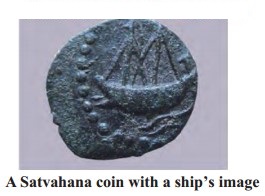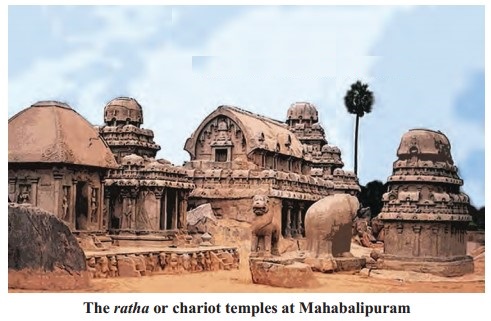Chapter 9 Ancient Kingdoms of the South
Textbook Questions and Answers
1. Can you tell ?
Question 1.
Whose name did the Satavahana kings write before their own?
Answer:
Jhe Satavahana kings were known to follow the custom of writing their mother’s name before their own.
Question 2.
The ancient name of Kolhapur.
Answer:
The ancient name of Kolhapur was ‘Kuntal’.
2. Complete the table by reading the map in the lesson:
Pallava | Kanchi |
Aihole, Badami, Pattdakal | |
Satavahana |
Answer:
Pallava | Kanchi |
Chalukya | Aihole, Badami, Pattdakal |
Satavahana | Ajanta, Ellora, Nashik, Bhokardan |
3. Tabulate the following names as dynasties and their capitals:
Satavahana, Pandya, Chalukya,Vakataka, Pallava, Madurai, Pratishthan, Kanchipuram, Vatapi
Answer:
Dynasty Capital | ||
Satavahana | Pratishthan | |
Chalukya | Vatapi | |
Vakataka | Vatsagulm | |
Pallava | Kanchipuram | |
Pandya | Madurai |
4. Observe any three picture in the lesson and write in your own words what you learn from them:
Answer:
The Kailas Temple:

The Kailas temple at Ellora in Maharashtra was carved out during the reign of Krishna Raja I. This temple is the largest rock-cut monolithic ancient Hindu temple. This temple gets its name Kailas as it symbolizes mount Kailas, the home of Lord Shiva.
A Satavahana coin:

Indian trade was at its zenith during the Satavahana period. Indian goods were exported to western countries and even as far as Rome. Trade took place by sea and this fact is known through coins which have the image of a ship carved on it.
The Ratha or chariot temples:

The rathas or shrines shaped as temple chariot are hewn from the granite rock. They are a perfect example of monilithic rock-cut architecture of the Pallava dynasty. These group monuments at Mahabalipuram has been classified as a UNESCO World Heritage Site.
5. Answer in one sentence:
Question 1.
Name the ancient dynasties of Southern India.
Answer:
The Cher, Pandya and Chola dynasty were the ancient dynasties of Southern India.
Question 2.
After the decline of the Mauryan Empire which local kings became independent?
Answer:
After the decline of the Mauryan Empire, the local kings in Maharashtra, Andhra Pradesh, Karnataka became independent.
6. Anwer in brief:
Question 1.
Write about the achievements of Mahendra Varman.
Answer:
- Mahendra Varman was an able Pallava ruler.
- He expanded the Pallava kingdom.
- He was also a playwright.
Question 2.
What is meant by Tri-samudra-toya-peet- vahnah?
Answer:
Tri-samudra-toya-peet-vahnah means ‘one whose houses have drunk the water of three seas’. It simply means to describe the one whose kingdom is so vast that it extends to the three seas, i.e. Arabian sea, the Bay of Bengal and the Indian Ocean.
Question 3.
What goods were exported from the Muziris port?
Answer:
Goods like spices, pearls, precious stones were exported from the Muziris port.
Activity:
Make a collection of the pictures in the chapter and display them in the school exhibition
Additional Important Questions and Answers
Complete the sentence by choosing the correct option:
Question 1.
Muziris is mentioned as an important port on the coast of _______.
(a) Kerala
(b) Tamil Nadu
(c) Chennai
Answer:
(a) Kerala
Question 2.
Muziris port was in the ______ Kingdom and was a major centre for export.
(a) Chola
(b) Pandya
(c) Cher
Answer:
(c) Cher
Question 3.
The Pandya kingdom was a part of today’s ______.
(a) Karnataka
(b) Tamil Nadu
(c) Maharashtra
Answer:
(b) Tamil Nadu
Question 4.
The capital of the Pandya kingdom was ______.
(a) Kodaikanal
(b) Maharashtra
(c) Madurai
Answer:
(c) Madurai
Question 5.
After the decline of the Mauryan Empire, the local kings in Maharashtra, Andhra Pradesh Karnataka also became _____.
(a) independent
(b) dependent
(c) republic
Answer:
(a) independent
Question 6.
Pratishthan or the present day Paithan in ______ was the capital of Satvahana Dynasty.
(a) Delhi
(b) Maharashtra
(c) Andhra Pradesh
Answer:
(b) Maharashtra
Question 7.
King Simuk was the founder of the _______ dynasty.
(a) Satavahana
(b) Vakataka
(c) Chalukya
Answer:
(a) Satavahana
Question 8.
The inscription in the _______ caves near Junnar in Pune district bear the names of the important persons of this dynasty.
(a) Kanheri
(b) Kolhapur
(c) Naneghat
Answer:
(c) Naneghat
Question 9.
Of the ________ Kings, Gautamiputra Satakarni is particularly well known.
(a) Chalukya
(b) Satavahana
(c) Vakataka
Answer:
(a) Chalukya
Question 10.
Satakarni defeated the _________ king Nahpana.
(a) Shaka
(b) Cher
(c) Paithan
Answer:
(a) Shaka
Question 11.
The famous poetic work Gatha-Saptashati in Maharashtri, was ________ by the Satavahana king Hala.
(a) composed
(b) edited
(c) sung
Answer:
(a) composed
Question 12.
Indian trade ________ greatly during the Satavahana period.
(a) decreased
(b) increased
(c) receded
Answer:
(b) increased
Question 13.
Paithan, Ter, Bhokardan, Kolhapur were recognised as important centres of ________.
(a) music
(b) culture
(c) trade
Answer:
(c) trade
Question 14.
Indian goods were exported as far away as ________.
(a) America
(b) Rome
(c) Sri Lanka
Answer:
(b) Rome
Question 15.
The cave sculptures at Ajanta, Nashik, Karla, Bhaje, Kanheri, Junnar in Maharashtra were carved during the ______ period.
(a) Satavahana
(b) Vakataka
(c) Cher
Answer:
(a) Satavahana
Question 16.
The power of the Satavahanas began to _______ by the third century CE.
(a) strengthen
(b) weaken
(c) flourish
Answer:
(b) weaken
Question 17.
Among the dynasties that emerged after the Satavahana period was the Vakataka, a _______ dynasty.
(a) powerful
(b) varied
(c) dynamic
Answer:
(a) powerful
Question 18.
The Vakataka dynasty was founded by _____.
(a) King Pravarsen
(b) King Pulakeshi
(c) King Vindhyashakti
Answer:
(c) King Vindhyashakti
Question 19.
King Vindhyashakti was ______ by Pravarsen I.
(a) succeeded
(b) finalised
(c) demoralised
Answer:
(a) succeeded
Question 20.
Chandragupta II had married his daughter Prabhavati to _________, the Vakataka king.
(a) Dantidurg
(b) Setubandh
(c) Rudrasen II
Answer:
(c) Rudrasen II
Question 21.
Varahdev, a minister of the Vakataka king Harishen, was a follower of _______.
(a) Judaism
(b) Buddhism
(c) Elinduism
Answer:
(b) Buddhism
Question 22.
Kalidasa’s ______ also belongs to the Vakataka period.
(a) Meghadoot
(b) Setubandh
(c) Saptashati
Answer:
(a) Meghadoot
Question 23.
The Chalukya dynasty in _____ was a powerful one.
(a) Sri Lanka
(b) Karnataka
(c) Nepal
Answer:
(b) Karnataka
Question 24.
Pulakeshi I established the rule of the Chalukya Ancient Kingdoms of the South dynasty in the _______ century CE.
(a) fourth
(b) fifth
(c) sixth
Answer:
(c) sixth
Question 25.
The famous temples at Badami, Aihole and Pattadakal were built during the _______ period,
(a) Vakataka
(b) Satavahana
(c) Chalukya
Answer:
(c) Chalukya
Question 26.
The Pallavas were also powerful dynasty in ______ India.
(a) South
(b) North
(c) East
Answer:
(a) South
Question 27.
_______ in Tamil Nadu was the capital of the Pallava dynasty.
(a) Mahabalipuram
(b) Kanchipuram
(c) Ellora
Answer:
(b) Kanchipuram
Question 28.
Mahendra Varman was an able _______ ruler.
(a) Chalukya
(b) Pallava
(c) Vakataka
Answer:
(b) Pallava
Question 29.
The famous ‘ratha’ temples of ________ were sculpted during the reign of Mahendra Varman.
(a) Maharashtra
(b) Kaniyakumari
(c) Mahabalipuram
Answer:
(c) Mahabalipuram
Question 30.
The Pallavas had a powerful and well equipped ______.
(a) army
(b) navy
(c) airforce
Answer:
(b) navy
Question 31.
The Rashtrakuta dynasty was first established in ______ by king Dantidurg.
(a) Mahabalipuram
(b) Nepal
(c) Maharashtra
Answer:
(c) Maharashtra
Question 32.
Krishna Raja I had the famous Kailas temple carved at _______.
(a) Ellora
(b) Ajanta
(c) Kanheri
Answer:
(a) Ellora
Answer in one sentence:
Question 1.
Name the ancient dynasties of Southern India.
Answer:
The Cher, Pandya and Chola dynasty were the ancient dynasties of Southern India.
Question 2.
Which ancient port is mentioned as an important port?
Answer:
‘Muziris, is mentioned as an important port on the coast of Kerala.
Question 3.
What was the capital of the Paridya kingdom?
Answer:
The capital of the Pandya kingdom was Madurai.
Question 4.
What was the capital of the Satavahana dynasty?
Answer:
Pratishthan or the preseht day Paithan in Maharashtra was the capital of the Satavahana dynasty.
Question 5.
Who was the founder of the Satavahana dynasty?
Answer:
iCing Simuk was the founder of the Satavahana dynasty.
Question 6.
Which custom did the Satavahana kings follow?
Answer:
The Satavahana kings were known to follow the custom of writing their mother’s name before their own.
Question 7.
Name a popular Satavahana king.
Answer:
Gautamiputra Satakarni was a very well known Satavahana king.
Question 8.
What title was given to Gautamiputra Satakarni?
Answer:
Gautamiputra Satakarni was awarded the title Tri-samudra-toya-peet-vahan’.
Question 9.
Give the extent of the Satavahana empire.
Answer:
The Satavahana empire extended from the river Narmada in the north to the Tunga- bhadra river in the south.
Question 10.
Name the trade centres of the Satavahana period.
Answer:
Paithan, Ter, Bhokardan, Kolhapur were recognised as important trade centres of the Satavahana period.
Question 11.
Which caves were sculpted during the Satavahana period?
Answer:
The Caves at Ajanta, Nashik, Karla, Bhaje, Kanheri, Junnar in Maharashtra were carved during the Satavahana period.
Question 12.
Which dynasty emerged after the Satavahan dynasty?
Answer:
The Vakataka dynasty emerged after the Satavahana dynasty.
Question 13.
Who founded the Vakataka dynasty?
Answer:
The Vakataka dynasty was founded by king Vindhyashakti.
Question 14.
What did the Vakataka king, Pravarsen II compose?
Answer:
The Vakataka king Pravarsen II composed ‘Setubandh’ in Maharashtra.
Question 15.
What was the name of Kalidasa’s literature?
Answer:
Kalidasa’s literature was ‘Meghdoot’.
Question 16.
Which powerful dynasty was from Karnataka?
Answer:
The Chalukya dynasty was a powerful dynasty from Karnataka.
Question 17.
Name the capital of the Chalukya dynasty.
Answer:
Badami or Vatapi was the capital of the Chalukya dynasty.
Question 18.
Name the temples built during the Chalukya period.
Answer:
The famous temples at Badami, Aihole and Pattadakal were built during the Chalukya period.
Question 19.
Which powerful dynasty existed in South India?
Answer:
The Pallavas were a powerful dynasty in South India.
Question 20.
Name the capital of the Pallava Kingdom.
Answer:
Kanchipuram in Tamil Nadu was the capital of the Pallava kingdom.
Question 21.
What is characteristic of the ‘ratha’ temples?
Answer:
The ‘ratha’ temples of Mahabalipuram are characteristic to have been sculpted from a single rock.
Question 22.
Write Yuan Chwang’s opinion about the Pallava kings.
Answer:
Yuan Chwang visited Kanchi and recorded that people of all religions received tolerant and just treatment under the rule of the Pallava kings.
Question 23.
Who was the founder of the Rashtrakuta Dynasty?
Answer:
King Dantidurg was the founder of the Rashtrakuta Dynasty.
Question 24.
Who sculpted the Kailas temple at Ellora?
Answer:
Krishna Raja I had the famous Kailas temple carved at Ellora.
Answer in brief:
Question 1.
Describe the work of literature by king Hala.
Answer:
The Satavahana king Hala composed the famous poetic work Gatha-Saptashati in Maharashtrin a Prakrit language.
This work provides information about the life of the people during the Satavahana period.